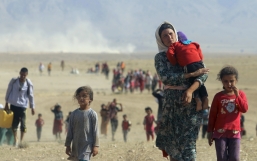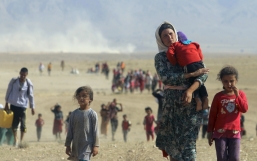
Images have emerged showing a man thrown from a tall building and then stoned to death when he survived the fall.
According to the London-based Syrian Observatory for Human Rights, the incident took place in Tal Abyad, Raqqa – a known ISIS stronghold.
The man charged with having a "homosexual affair" is shown blindfolded and sitting on a plastic chair, before being hurled off a seven-story building. According to reports, he survived the fall but was beaten to death by people gathered on the ground who formed a circle and threw stones at him. Images appear to show one person holding an Islamic State flag.
The incident follows a number of executions by ISIS militants this month, including two men accused of homosexual acts being thrown off a building in Ninevah. At least 17 young men are believed to have been crucified by the group for unknown crimes.
Images attributed to the "Information Office of the mandate of Ninevah" declare that jihadis are carrying out "hudud" – fixed punishments for crimes considered serious by the extremist group.
ISIS released a list of these punishments in December. According to its penal code, anyone who blasphemes against Allah must be killed, while drinking alcohol should result in 80 lashes. Murder and stealing are punishable by death by crucifixion, and parties involved in homosexual acts are also condemned to death.
Supporters are encouraged to watch and even take part in these punishments, which are brutally enforced. They are believed to come from a fundamental interpretation of the Qur'an.
ISIS has also issued guidelines for how its militants are to treat their female slaves.
A document released last year claimed that female captives are "merely property, which can be disposed of" – ie bought, sold or given away. A man is free to have sex with a virgin female slave as soon as he buys her, though a woman who is not a virgin must have her uterus "purified" first.
"What makes al-sabi [taking women captive] permissible is [her] unbelief. Unbelieving [women] who were captured and brought into the abode of Islam are permissible to us, after the imam distributes them," the pamphlet prescribed.


















